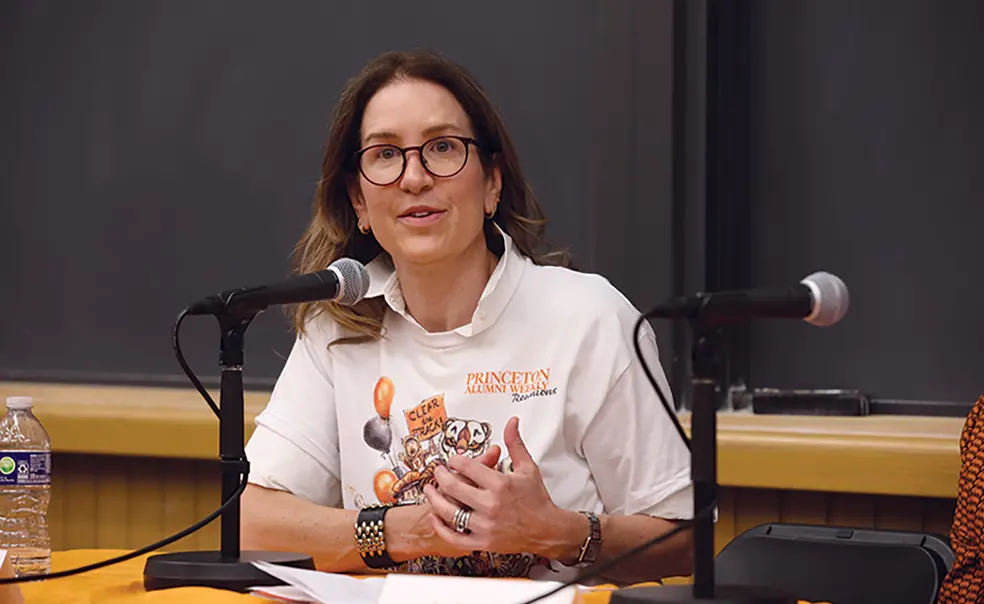Reunions Panels Shine a Spotlight on Mental Health
“When mental health is on the fritz … every aspect of our health is at stake,” said Lucy McBride ’95
There are many good reasons to care about mental health, but the bottom line might be physician Lucy McBride ’95’s.
“Health is the integrated sum of our behavioral, physical, social-emotional health, and spiritual health,” McBride said at PAW’s Reunions panel on Friday. “When mental health is on the fritz … every aspect of our health is at stake.”
Titled “Student Mental Health: Is It a Crisis, and What Can Be Done?” the discussion delved into what’s causing the anxiety and depression that’s on the rise among college students — including at Princeton. Chioma Ugwonali ’24, a student leader in mental health on campus, said she sees peers overly anxious about getting the right jobs and living up to the Princeton name.
Joshua Blum ’02 said that as a psychologist at Bucknell and Susquehanna universities, he tells students that previous generations didn’t always see a clear path ahead, either, but they figured it out. Just watch films like The Graduate or Say Anything, he said.
Blum noted that students aren’t alone in how they feel: Professors are also struggling as students come to them for help in a way that didn’t happen with past generations.
He and the other panelists listed tangible things to help, like getting outside, exercising, and finding passions to pursue at every age. Jess Deutsch ’91, who writes PAW’s student mental health column, “The Whole Student,” said it can help to ask people how they’re doing and then really listen to the answer so the person feels heard.
“But from others I feel like there’s a temptation to label these suicides as freak accidents, something that just happened … ‘We’re in a mental health crisis, so there’s nothing we can do’ — I hear that response more often than I would’ve hoped.”
— Noah Luch ’24
Past co-chair of the student government’s Mental Health Committee
Jeremy Nobel ’77, author of Project UnLonely, said loneliness is the biggest preventable risk factor for depression, and societal discrimination can make it systematic. There’s a psychological benefit, he said, to connecting with something greater than ourselves — “the bigger human story.”
At another mental health panel that followed PAW’s, student and University leaders shared both updates and challenges Princeton’s community has faced. Noah Luch ’24, a past co-chair of the student government’s Mental Health Committee, said that six Princeton students died by suicide while he was here. Over time, numbness seemed to set in on campus, he said.
“I’ve been disappointed, and to some extent, I’ve been ashamed, of the response,” Luch said. He said he’s seen some people at Princeton “really put their hearts into making sure students are loved and supported. But from others I feel like there’s a temptation to label these suicides as freak accidents, something that just happened … ‘We’re in a mental health crisis, so there’s nothing we can do’ — I hear that response more often than I would’ve hoped.”
Calvin Chin, director of Counseling and Psychological Services (CPS), said he hears that frustration but is encouraged by the changes he’s seen over 10 years in his job: Grade deflation was abandoned, staff at CPS increased 40%, and a push by students led to better handling of medical leave situations. “There are tangible things that have happened, and at the same time there is absolutely more that could be done,” Chin said.
Luch noted that many alumni at Reunions are or will be parents, and he offered them advice: Talk to your kids about mental health, including your own experiences, and tell them, “I am not ever going to associate your worth with your academic standing. I am never going to associate what career path you go down … with how much I care and love about you.”












1 Response
Jim Perry ’57
1 Year AgoPanic and Its Impact on Mental Health
May I suggest that suicide is a reaction to panic? When students are paralyzed by contradiction, the resulting panic is quite literally diabolical, and not everyone knows how to resolve contradiction without leaving the situation entirely by drugs or suicide.
Families and other institutions can be self-contradictory as well as contradicting each other, but what is far worse is that surrendering the power of agency to some external institution deprives the individual of every power except the power to quit. A healthier course is to build a strong, alert self that can resolve its contradictions.
The history of philosophy since Pythagoras, Parmenides, and Plato, all the way up to Daniel Kahneman’s Thinking Fast and Slow, has been a quest to relate the routine level of thinking that does our work quickly, and the reflective level of thinking that decides what work we will do, and in what order, resolves contradictions, and creates new routines as necessary.
I speak from personal experience. Once, a Princeton dean invited me into his office without an appointment but blamed me for not having made an appointment. I panicked, and the only choice I could think of was to leave so I quit Princeton. His response was to assure me he’d take care of the paperwork.